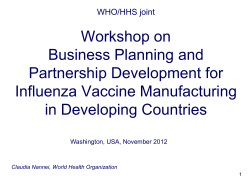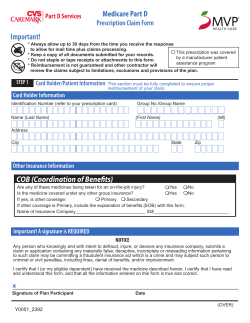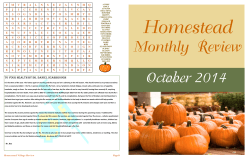
NATIONAL COLD CHAIN & VACCINE MANAGEMENT
NATIONAL COLD CHAIN & VACCINE MANAGEMENT RESOURCE CENTRE (NCCVMRC) NATIONAL INSTITUTE OF HEALTH & FAMILY WELFARE MINISTRY OF HEALTH & FAMILY WELFARE GOVERNMENT OF INDIA VISION NCCVMRC will facilitate the establishment of a high quality, effective and efficient immunization supply chain in India to ensure universal immunization coverage with safe and potent vaccines MISSION Provide technical support for all cold chain & vaccine logistics management initiatives at the national level as per the directives of the Immunization Division, Ministry of Health & Family Welfare, Government of India Enhance the capacity of all staff, program managers and policy makers in the country to run an effective and efficient immunization supply chain Ensure the development of a comprehensive and integrated monitoring system across all levels of the immunization supply chain in the country Function as the nodal resource centre for all immunization supply chain related research, training, planning and policy initiatives in India MANDATE • Develop, operationalize and scale up the National Cold Chain MIS and Vaccine Logistics management MIS across all states, districts and cold chain points of India • Conduct periodic assessments/ studies in CC&VLM • Develop training packages on cold chain and vaccine management based on training need, performance gap and programme need • Capacity building of Programme managers at all levels on cold chain and vaccine management in addition to cold chain technicians • Undertake regular reviews of cold chain and vaccine management both at national and state level • Provide technical support to MoHFW and states on cold chain equipment, building, spare parts standard and other CC&VLM components. • Undertake regular vaccine & cold chain temperature monitoring of bulk vaccine storage sites to ensure vaccine quality • Function as the Secretariat for the NCCVLAP development and implementation • Function as national resource centre for conducting EVM at national and state and development of improvement Plan following the assessment ACHIEVEMENTS Activities Training Studies and Assessment Consultation workshop Technical support to MOHFW NCCTC, Pune • 197 technicians trained on WIC/WIF • 3 batches SNCU Training for 3 states • Developed draft training module for ILR/DF and WIC/WIF • Temperature study of vaccine carrier hold over time • Prepared Proposal for Freeze Markers study • WHO-PQS workshop NCCVMRC New Delhi • 280 technicians trained on ILR/DF • 172 state trainers trained on NCCMIS • Facilitators orientation on ECCVMC • Revised Cold chain handlers training module • National Cold Chain assessment 2014 • Hybrid Solar System evaluation in Maharashtra • EVM assessment in Assam and Odisha • NCCVLAP workshop • Participated in 3 MOHFW • GOI Coding of spares in 2 meetings of CCE and vaccine GMSDs van specification • Delhi and Himachal Pradesh • Delhi SVS WIC failure Support to SVS WIC failure • All NE states for CC planning state ( Major • All NE states for CC planning and strengthening of CC Cold chain and strengthening of CC • District level NCCMIS review failure , • Health Equipment MIS and training in 8 states NCCMIS Development for MH state training , • Hybrid Solar Scale up in MH • Retro fitting of WIC NCCTC, Pune • Developed and piloted face plate with Electronic Innovation and microprocessor for replacement of spares in 11 states CCE test • Mapping of Indian compatible spare parts laboratory • Develop prototype of integrated AMF controller ,master logger development and temp controller for WIC/WIF • Completed WHO-PQS laboratories visit and developed draft Lab establishment proposal MIS NCCVMRC development • NCCMIS implementation in all states and UTs and • NCCMIS maintenance and helpline support maintenance • NCCMIS augmentation proposal Temperature NCCVMRC has a temperature monitoring cell which provides Monitoring of regular feedback to the 10 states with 54 cold room with WIC/WIF wireless data loggers NATIONAL COLD CHAIN ASSESSMENT 2014 Primary Objective: To assess the adequacy of the existing cold chain space in the country. Secondary Objectives: To project future cold chain requirements in view of newer vaccine introduction. To update the status of cold chain points across the country, including electricity supply. To assess the cold chain related staff and training status. To provide information on dry storage space requirements at various levels. To update the status of spare parts availability and requirement. To assess the readiness of states for cold room installation. To recommend solutions to develop improvement plan by states. To validate the NCCMIS data through the NCCA field assessment. Methodology Desk Review NCCMIS, CCO Review Meetings data and National EVM Data Data Collection Certified copy of all the states on CCE and infrastructure in the prescribed Field validation Field visits to assess the data as per the primary and secondary Analysis & documentation Data analysis and report preparation based on certified data and field 138 sites were covered by 48 investigators in the assessment consisting of 16 State Vaccine Stores, 30 Regional Vaccine Stores, 46 District Vaccine Stores and 46 Health Facilities. Key findings: Summary of cold chain equipment in the country Equipment type WIC 32 m3 WIC 16.5 m3 No. (CFC) 6 No. Items stored (CFCFree) 13 BCG, Measles, Pentavalent, TT, DPT, DT, HepB, JE 81 126 BCG, Measles, Pentavalent, TT, DPT, DT, HepB, JE WIF 32 m3 NIL 8 OPV, Ice packs WIF 20 m3 NIL 4 OPV, Ice packs 1 30 OPV, Ice packs WIF 16.5 m3 ILR Large 1017 4325 BCG, Measles, Pentavalent, TT, DPT, DT, HepB, JE ILR Small 9295 22,569 BCG, Measles, Pentavalent, TT, DPT, DT, HepB, JE, DF Large 791 DF Small 7089 Cold box (20 Liters) Cold box (5 Liters) Vaccine carrier OPV 5499 OPV, ice packs 21,040 Ice packs 32,628 Mixed antigens 26,452 Mixed antigens 11,28,413 Mixed antigens Summary requirement of additional cold chain equipment Type of equipment Additional equipment required for current UIP Additional requirement for current UIP + IPV Additional equipment required for current UIP + Rotavirus Additional equipment required for current UIP + IPV + Rotavirus WIC 32 m3 39 48 39 48 WIF 32 m3 23 23 38 38 ILR large 2124 2601 2742 3506 ILR small 11,641 11,641 11,641 11,641 DF large 54 54 54 54 DF small 10,327 10,327 10,327 10,327 Summary of HR requirement for cold chain Total positions needed Designation In position Additional required Cold chain officer 36 20 16 Vaccine and logistics manager 36 5 31 Astt. Cold chain officer 15 Nil 15 Technical assistant 36 8 28 666 467 199 28,882 29,850 0 Cold chain technicians Cold chain handlers Distribution of Cold chain points 4000 No. of CCPs 3500 Pop/ CCP 3000 2500 2000 1500 1000 CCP Pop/CCP Daman & Diu Lakshadweep Dadra & Nagar Haveli Goa Sikkim Puducherry Andaman & Nicobar Islands Mizoram Chandigarh Tripura Manipur Nagaland Meghalaya Jharkhand Arunachal Pradesh NCT Delhi Uttarakhand Chhattisgarh Himachal Pradesh Jammu & Kashmir Bihar Haryana Assam Punjab Telangana Orissa Uttar Pradesh Kerala Madhya Pradesh Andhra Pradesh Gujarat West Bengal Rajasthan Tamil Nadu Karnataka 0 Maharashtra 500 200000 180000 160000 140000 120000 100000 80000 60000 40000 20000 0 NATIONAL COLD CHAIN MANAGEMENT INFORMATION SYSTEM During the various past State Expanded Programme Immunization Officers/Cold Chain Officers Review meeting request has been made by the State Cold Chain Officers to have a system which will be helpful in managing and monitoring the cold chain equipment and also helpful in taking management decisions related to cold chain using real time information. Acting on the felt need of a MIS system the MoHFW in partnership with UNICEF developed the web based NCCMIS to monitor the cold chain system in real time setting across the country. The MoHFW looks at the NCCMIS not only as a software but as a comprehensive tool to streamline the cold chain system. It is envisaged as a tool for planning and taking management decisions based on real time information, as a monitoring tool for current equipment status, as a repository of cold chain equipment for the country and as a platform for future innovations in cold chain and vaccine management. NIHFW, through the NCCVMRC, is responsible for the overall maintenance and implementation monitoring of the NCCMIS across the country including providing helpline support to end users. The NCCMIS Dashboard NCCMIS features • More than 60 reports are generated at national, state, district, block and up to PHC levels on key cold chain indicators including: o Model Wise Inventory of cold chain equipment consisting of electrical and non-electrical equipment o Net Cold Chain Space availability o Model wise breakdown status and durations o Aging of equipment o Repair and Preventive Maintenance details o Availability and consumption of Spare parts o Sickness rate o Down time & Response time o Cold chain point information o Human resource and training status • The NCCMIS enables program managers and policy makers to have a comprehensive view of the cold chain system in their area and arrive at decisions o Track the entire life cycle and journey of cold chain equipment o Provide an online inventory of cold chain equipment across the country o Record and monitor key cold chain performance indicators o Facilitate cold chain equipment and space planning along with replenishment strategy o Facilitate cold chain point planning and rational distribution o Human Resource availability and training status o Procurement plan for cold chain equipment o Projection of future space requirement in the event of increase population, newer vaccine introduction Proposed scope of NCCMIS augmentation 1. Integration of NCCMIS with various Vaccine and Logistic Management Information System , Ex BVLMS, OVLMS, EVIN, State specific VLMIS with creation of a Vaccine Management Module 2. Incorporate Effective Vaccine Management (EVM) assessment module with NCCMIS 3. SMS system for Equipment and Vaccine update status at last cold chain point 4. File management system integration with NCCMIS for all official communication related to cold chain and vaccine management 5. Cold chain & vaccine management Supportive Supervision Checklist integration with NCCMIS. 6. GIS Mapping of all cold chain point, Sub center and Immunization session 7. Effective temperature monitoring system integration with NCCMIS for real time temperature monitoring of all cold chain equipment ONLINE TEMPERATURE MONITORING 54 WIC/ WIFs across 10 states have wireless data loggers installed which transmit real time temperatures to the NCCMIS for continuous quality monitoring of bulk vaccine stores NCCVMRC regularly monitors the temperature reports and follows up with the states in case any action is required based on the temperature readings observed. The temperature monitoring dashboard
© Copyright 2025









